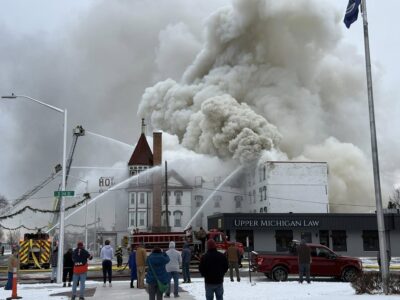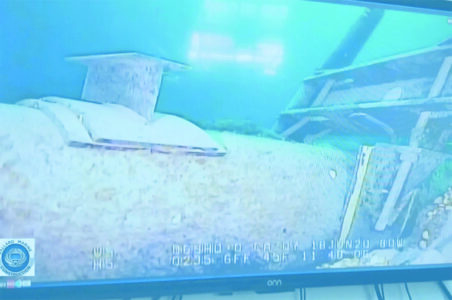Smoky haze blankets Marquette

A smoky haze is seen in the skies above Downtown Marquette Tuesday morning. A strong smoky odor and reduced visibility continued to linger throughout the day Tuesday due to smoke from Canadian wildfires. (Journal photo by Randy Crouch)
MARQUETTE – Heavy smoke from Canadian wildfires created poor air quality, reduced visibility and a smoky smell throughout parts of the Upper Peninsula Tuesday morning.
The current air quality issues date back to Thursday, when the Michigan Department of Natural Resources issued an air quality advisory for counties in the central and western U.P.
Reports of heavy smoke were reported as far north as Copper Harbor, with the National Weather Service extending its warning through Tuesday.
According to Accuweather, the levels of Fine Particulate Matter were more than three times the acceptable level due to the smoke.
“(Fine Particulate Matter: are inhalable pollutant particles with a diameter less than 2.5 micrometers that can enter the lungs and bloodstream, resulting in serious health issues. The most severe impacts are on the lungs and heart. Exposure can result in coughing or difficulty breathing, aggravated asthma, and the development of chronic respiratory disease.”
“We’ve had to keep our windows closed and not go outside at all,” said Kathleen Crouch of Calumet. “I couldn’t even go to my granddaughter’s softball game.”
The Associated Press reported that more than 25,000 residents in three Canadian provinces have been evacuated due to dozens of wildfires, which has caused similar air quality issues around Canada and the Midwestern United States.
Most of the evacuated residents were from Manitoba, a province that has been under a state of emergency since last week.
The National Weather Service updated their warning on Tuesday, saying that conditions will continue through today and advises that you avoid strenuous activity and keep your windows closed.
Everyone living under the warning is advised to monitor for symptoms like weezing, coughing, chest tightness, dizziness or burning in the nose, throat and eyes.
Randy Crouch can be reached at 906-228-2500. His email address is rcrouch@miningjournal.net.




